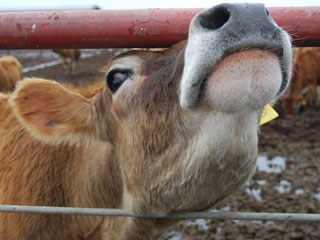For more than 50 years, California has been the no. 1 agricultural exporter, the fifth largest supplier of food and farm commodities in the world, and supplies 99 percent of almonds, artichokes, dates, pistachios, pomegranates and walnuts in the nation.
This week’s National Agriculture Week on campus celebrates the diversity of Fresno County agriculture, highlighting the billion-dollar industry and its effects and import to student life.
“Agriculture is the no. 1 industry in the Central Valley and is not only important here, but is important for our country and the world, given the level of production that occurs here,” said Kathie Reid-Bevington, interim associate dean of the Jordan College of Agricultural Sciences and Technology.
In honor of National Agriculture Week, the Jordan College Student Leadership Council will host a series of events throughout this week. The events include: “Coffee and Cake with the Dean” held on Monday; the Jordan College Carnival today in the Free Speech Area; and the Jordan College Olympics Friday on the Agricultural Sciences Building lawn.
Senior agriculture communications major Monique Bienvenue said that she was honored to help plan National Agriculture Week.
She said that many students often don’t realize the importance of agriculture.
“I never had the opportunity to join FFA or 4-H, intact, I didn’t even know those programs existed until I came to Fresno State,” Bienvenue said.
Originally growing up in Los Angeles, Bienvenue noticed a growing disconnect between agriculturalists and those living in urbanized areas. After realizing just how much farmers do for the world, Bienvenue said she was driven to change her major to agriculture communications.
“As time goes by, the world’s population is only going to continue to grow, and with a growing demand for food, comes greater responsibilities for agriculturalists,” Bienvenue said. “It’s imperative that those who are removed from the agriculture industry are aware of what’s going on in the Central Valley. The more they understand agriculture, the more power they have in combating food insecurity.”
Eryn Worthing, a senior animal science major, said that despite many students growing up in the Central Valley, many often don’t know where their food comes from.
“I think National Ag Week is a great idea because it gives us a chance to teach our fellow students more about our industry,” Worthing said.
She says that there are many steps in the process in order to get food to the table.
“People tend to take their food for granted, without realizing that there is an entire industry of people behind the scenes making sure animals are safe and healthy, crops are growing well and that the final product is not only nutritious and enjoyable, but also affordable and safe,” Worthing said.
With seven academic departments, including agricultural business, animal science and agricultural education, food science and nutrition, viticulture and enology, child, family, consumer sciences and industrial technology, the Jordan College of Agricultural Sciences and Technology comprises over 1,500 students.
“Celebrating National Agriculture Week is important as it provides our college with the opportunity to educate others in our campus community about the importance of agriculture,” Reid-Bevington said. “Every day, each of us is impacted by a variety of agricultural industries, and the more we know about the strengths of those industries, as well as the challenges they face, the better consumers and citizens we will be.”
Fresno County is one of the most diverse agricultural counties in the nation, with more than 1,499 farm operators of Asian descent, 140 of American Indian or Alaskan Native descent, and more than 52 farm operators of black or African-American descent, according to the USDA 2012 Census of Agriculture. One out of every five jobs in the Central Valley is related to agriculture.
Bienvenue said that she hopes National Agriculture Week continues to flourish. She hopes people realize that agriculture doesn’t just affect farmers, but everyone.
“Farmers need their stories to be told, and I’d like to help educate others on the farm-to-fork movement.”




